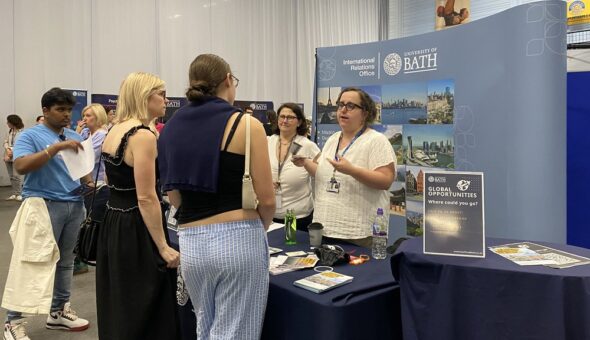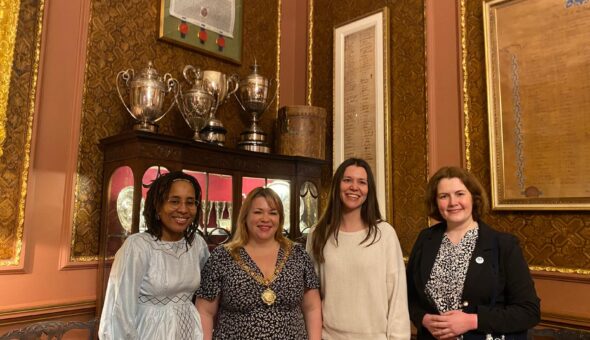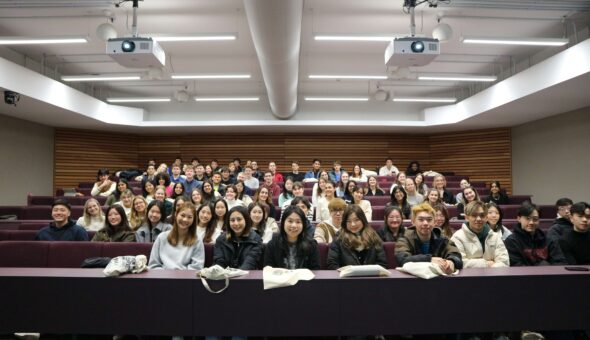Kirsten Brown, Placements Manager in the Faculty of Humanities and Social Sciences, tells us about her experience of meeting our Study & Work Abroad programme students in Hong Kong and Singapore.
The beginning of September saw me visiting the first cohort of Economics students studying on the Study & Work Abroad programme. Six students, two at each institution, are studying at the Chinese University of Hong Kong (CUHK), Nanyang Technological University (NTU) and the National University of Singapore (NUS). To say our students were having a great time is rather an understatement; never have I seen such happy and enthusiastic students, brimming full of confidence and waxing lyrical about their experiences so far.
First stop: Hong Kong
The chaotic but vibrant city of Hong Kong offers an intense experience for our students. CUHK, however, is based 45 minutes out of the centre of Hong Kong, close to the Northern Territories. Surrounded by views of islands and green hills the campus is a haven, perfect for study. Francisco and Alex, our students based at CUHK, took me on the short, minute walk to their college.
Part of the charm of this university is that it is based on the collegiate model popular in the US; both Alex and Francisco share a room with other students, local and international. Although not an experience they are used to, this is very common in Asia. Both are embracing the opportunity to live dorm style and build strong new friendships. The international student community is very active and CUHK offers a comprehensive and, most importantly fun, two- week induction for their international students. Alex and Francisco appeared to know everyone, and so far had managed to climb (yes, climb!) to the top of The Peak, sample the local street food and travel for a weekend to Thailand.
Students have a wide array of courses to choose from, including learning Putonghua (Standard Mandarin), and Chinese History. There are also courses offered by the Centre for China Studies, including ‘Chinese Business and Economy’ and ‘Investment and Finance in China’. Both Francisco and Alex were extremely keen to attend all their lectures, whether or not they were graded. The opportunity to study with such a multicultural community, located in a stunning setting and embracing the cultural experience through extra-curricular activities made me wish I had this awesome opportunity.
Although Hong Kong is as expensive as London, probably more so if you take in account the size of accommodation you get for your dollar, living at CUHK is cheap, and the students had already learnt how to budget. Your room for the entire semester is approximately £600, and you can eat at a wide variety of campus canteens for just over £5 per day; the sports facilities are free! Travelling on the MTR is super cheap, fast and efficient, and many bars in Lan Kwai Fong, the Soho of HK, offer happy hours most evenings. Hong Kong living is not for the faint-hearted; the heat in the summer, the grey drizzle in winter, the overwhelming crowds of people day and night, close-packed tower blocks and little space make for an intense experience. But, if you like buzz, raw culture, bright lights and skylines that take your breath away and the sense that you are part of a dynamic visionary city, then this experience is for you.
Second Stop: Singapore
NTU and NUS are two of the highest ranking universities in the world, both based in Singapore. Both of these institutions are the size of a small town, to the extent that it can take half an hour on a bus to travel from one end of NUS to the other. Senior Lecturer Dr Maik Schneider joined me in Singapore as he was on a two-week trip as a visiting scholar at the Department of Economics at NTU. Working collaboratively, between us we:
· presented to groups of potential incoming students at NUS representing the university
· visited students on the Study Abroad programme from the Faculty of Humanities and Social Sciences and the Faculty of Science, on behalf of the IRO.
Maik led a research seminar at the Centre for Economic Growth (NTU) attended by some of our Economics students and also presented at our other partner university located in the centre of Singapore, NUS.
Arguably, I had the more enjoyable task of spending time visiting our students on and off campus, and finding out more about the nitty-gritty of Singapore student life. Gabriele, Rodolph, Elanor and Jeremy, our Study Abroad students in Singapore, met me at one of the numerous eateries at NUS. Like Hong Kong, if you live and eat on campus it is as cheap as chow mein. There are differing standards of accommodation, with UTown being the highest standard of luxury student accommodation. From SGD2800 a semester (£1563 per semester/£520 a month) you can stay in a four-bed apartment; bearing in mind this doesn’t include food. Some accommodation you have to pay extra for air con (worth considering when the average daily temperatures tops 30 degrees!).
Something else to consider is how long it may take you to adjust to the heat and humidity. All students told me this was something they hadn’t anticipated; it can affect your sleep, your skin, and make you much more tired than normal. It takes a few weeks and then you will be back to using the free sports centres with aplomb, while visitors like me break out into a sweat just walking outside. This also applies to the change in a diet that is different to home - all that spicy food can take a little while to adjust to.
Extra-curricular activities are a big thing at NUS and a must to get the most out of your time spent here. Societies and groups the students are members of ranged from football to boxing, salsa, climbing and Lindy Hop. This is how you meet many more of the local students and break down those cultural barriers.
All students agreed that the stand out benefits of living and studying in Singapore were the lectures and the travelling. The students were all enthralled by the range of subjects on offer to study and the highly engaged and motivated lecturers. Like Hong Kong, students are awarded an attendance mark of 10% to their final grade for attending all of their lectures, but the students enjoy the teaching environment so much they are eager to attend all lectures, seminars and tutorials even without this incentive. There is also the opportunity to switch courses within the first three weeks of the semester, which really helps if you start a new subject but don’t feel it is really for you.
Alternatively, you could front-load your week full of lectures so that you have a long weekend to travel around South East Asia. With Malaysia, Thailand, Indonesia, Vietnam and Cambodia all within a two-hour flight, with airlines offering prices to go to Bangkok for less than a few pints and a burger in Bath, why not?
The trip came to a joyous end teaming up with Katie Calvert-Jones from the School of Management and hosting a drinks event in Clarke Quay on a balmy Tuesday evening. Katie, Maik and I met over 20 students on placement or studying in Singapore from the School of Management, and the Faculties of Humanities and Social Sciences Science.
It was a great opportunity to bring everyone together, many of them not knowing each other despite sharing not one but two universities! We were all so proud of our students and the global attitude they had already acquired, fully embracing life in this city far away from home. Each of us came away from that evening inspired by the students we had met and excited about the university’s partnerships in Asia, which are going from strength to strength.
Respond


